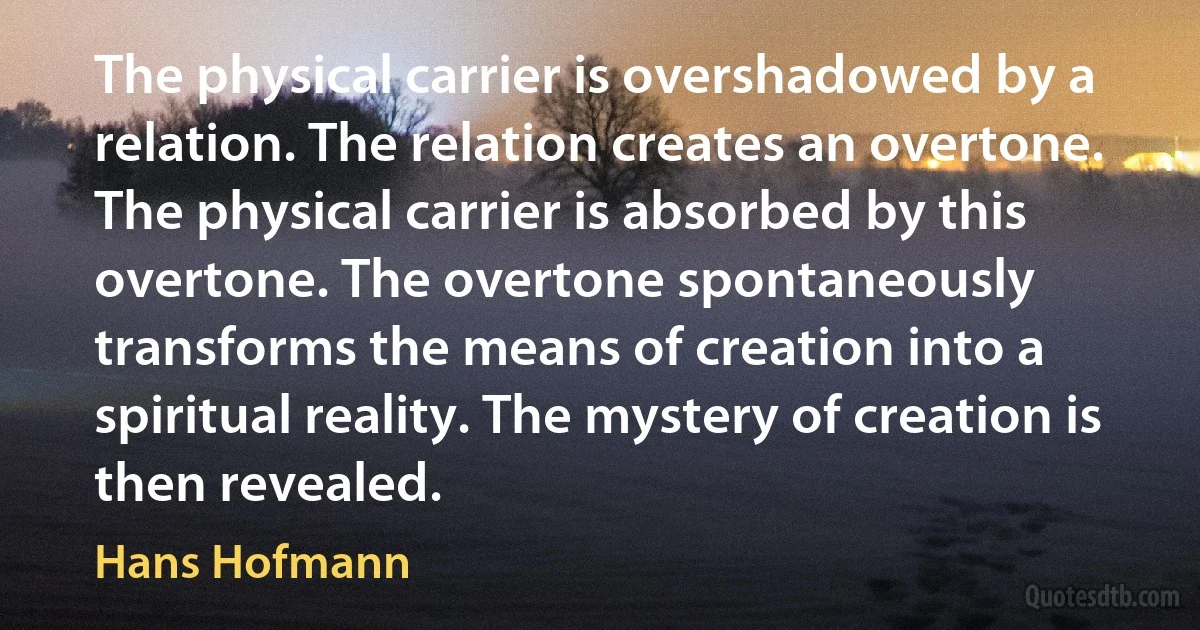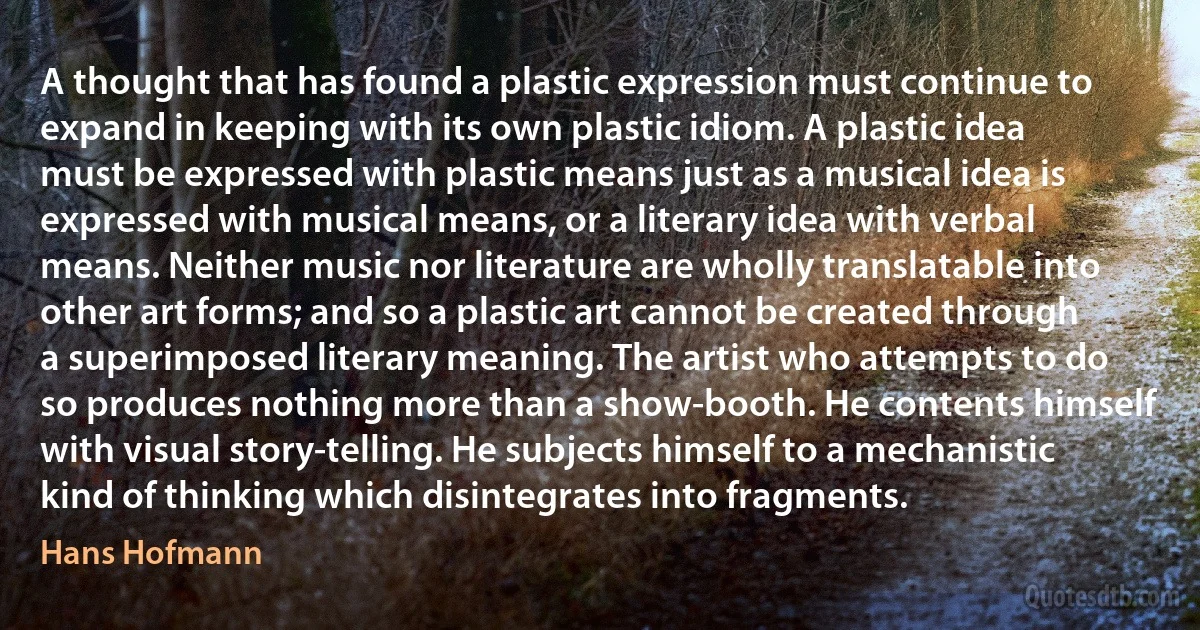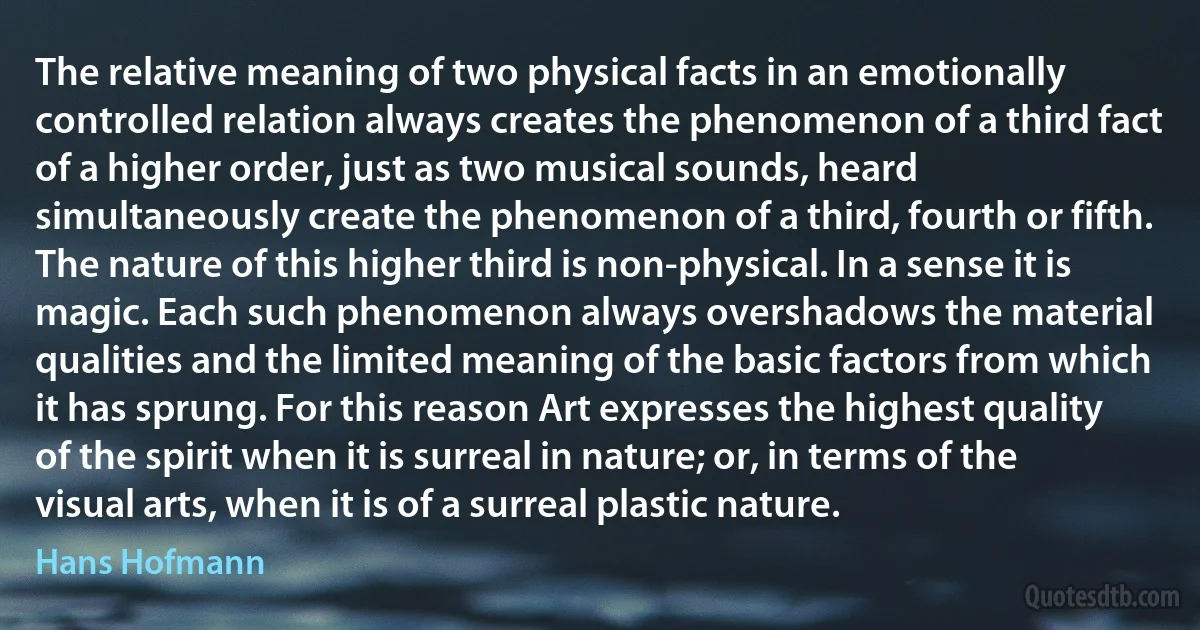Hans Hofmann quotes - page 3
This two-way transformation proceeds from metaphysical perceptions, for metaphysics is the search for the essential nature of reality. And so artistic creation is the metamorphosis of the external physical aspects of a thing into a self-sustaining spiritual reality. Such is the magic act which takes place continuously in the development of a work of art. On this and only on this is creation based.

Hans Hofmann
Creation is dominated by three absolutely different factors: First, nature, which works upon us by its laws; second, the artist, who creates a spiritual contact with nature and his materials; third, the medium of expression through which the artist translates his inner world. Of those three components only one, the medium, is material.

Hans Hofmann
I do not want to avoid immersing myself in trouble - to be a mess - to struggle out of it. I want to invent, to discover, to imagine, to speculate, to improvise - to seize the hazardous in order to be inspired. I want to experience the manifestation of the absolute - the manifestation of the unexpected in an extreme and unique relation. I know that only by following my creative instincts in an act of creative destruction will I be able to find it.

Hans Hofmann
My paintings are always images of my whole psychic makeup. You cannot deny yourself. You ask, am I painting myself? I'd been a swindler if I did otherwise. I'd be denying my existence as an artist. I've been also asked, what do you want to convey? And I say, nothing but my own nature... I am nothing but an optimist.

Hans Hofmann
Monumentality is an affair of relativity. The truly monumental can only come about by means of the most exact and refined relation between parts. Since each thing carries both a meaning of its own and an associated meaning in relation to something else - its essential value is relative. We speak of the mood we experience when looking at a landscape. This mood results from the relation of certain things rather than from their separate actualities. This is because objects do not in themselves possess the total effect they give when interrelated.

Hans Hofmann
Speech has arisen through the need for expression. Certain factors have contributed to making it the paramount utilitarian method of expression. There are ideas and things expressible in words, but there are ideas better expressed in music, the person with no musical ear, or without discipline in the language of music, lacks the key to the door of the world of musical experience. But we live in a world of volume and space; it is hard to conceive of the person who is space-blind or volume-deaf. The great majority of people have the means of approach to plastic beauty as part of their natural equipment. The teacher can develop this natural endowment as Necessity, the greatest teacher, has developed speech.

Hans Hofmann
Art is magic. So say the surrealists. But how is it magic? In its metaphysical development? Or does some final transformation culminate in a magic reality? In truth, the latter is impossible without the former. If creation is not magic, the outcome cannot be magic. To worship the product and ignore its development leads to dilettantism and reaction. Art cannot result from sophisticated, frivolous, or superficial effects.

Hans Hofmann
"A glimpse heavenward at a constellation or even at a single star only suggests infinity; actually our vision is limited. We cannot perceive unlimited space; it is immeasurable. The universe, as we know it through our visual experience, is limited. It first came into existence with the formation of matter, and will end with the complete dissolution of matter.

Hans Hofmann
The reciprocal relation of color to color produces a phenomenon of a more mysterious order. This new phenomenon is psychological. A high sensitivity is necessary in order to expand color into the sphere of the surreal without losing creative ground. Color stimulates certain moods in us. It awakens joy or fear in accordance with its figuration. In fact, the whole world, as we experience it visually, comes to us through the mystic realm of color. Our entire being is nourished by it. This mystic quality of color should likewise find expression in a work of art.

Hans Hofmann
One must realize that, apart from considerations of color and form, there are two fundamentally different ways of regarding a medium of expression: one is based on taste only - an approach in which the external physical elements of expression are merely pleasingly arranged. This way results in decoration with no spiritual reaction. Arrangement is not art. The second way is based on the artist's power of empathy, to feel the intrinsic qualities of the medium of expression. Through these qualities the medium comes to life... In this life, an intuitive artist discovers the emotive and vital substance which makes a work of art.

Hans Hofmann
The significance of a work of art is determined then by the quality of its growth. This involves intangible forces inherent in the process of development. Although these forces are surreal (that is, their nature is something beyond physical reality), they, nevertheless, depend on a physical carrier. The physical carrier (commonly painting or sculpture) is the medium of expression of the Surreal. Thus, an idea is communicable only when the surreal is converted into material terms. The artist's technical problem is how to transform the material with which he works back into the sphere of the spirit.

Hans Hofmann
Since one cannot create 'depth' by carving a hole in the picture, and since one should not attempt to create the illusion of depth by tonal gradation, depth as a plastic reality must be two dimensions in a formal sense as well in the sense of color. 'Depth' is not created on a flat surface as an illusion, but as a plastic reality. The nature of the picture plane makes it possible to achieve depth without destroying the two-dimensional essence of the picture plane.. A plane is a fragment in the architecture of space. When a number of planes are opposed one to another, a spatial effect results. A plane functions in the same manner as the walls of a building... Planes organized within a picture create the pictorial space of its composition... The old masters were plane-consciousness. This makes their pictures restful as well as vital...

Hans Hofmann



